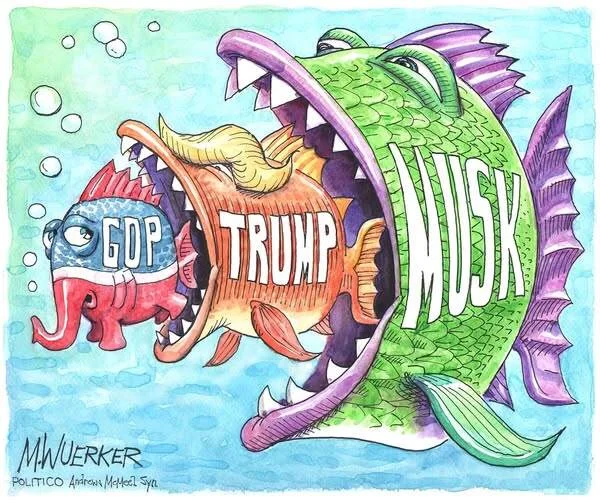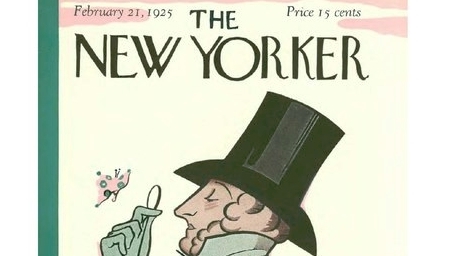CSotD: Boos and Bravos
Skip to commentsI’m picky when it comes to variations on the old fish-swallowing-fish concept.
First, it needs to be applicable, and, in this case, it is: Trump has swallowed the Republican Party — as demonstrated by the confirmations of his unqualified cabinet — and Musk is clearly in charge of Trump, as demonstrated by that jaw-dropping spectacle in the Oval Office the other day.
The other necessary element is that it be done well, and Wuerker hits the mark, with the dullard expression on the little fish and the wig on the middle fish, together with the middle fish having no awareness that he, too, is a victim.
It’s good when you can turn out a simple cartoon that doesn’t leave loose ends.
A simple cartoon, however, has to have some grounding on Planet Earth, and Wright’s piece sends a simple message, but it’s laughably off target, and not just because of that mighty head of hair.
I understand his point, that Trump is making amazing achievements, but I also keep up with the news and realize that much of what Trump has accomplished was either childishly simple, like renaming the Gulf of Mexico, or is currently being held up by temporary restraining orders for being either against the law or counter to the Constitution. He’s accomplished very little.
And if I were on his side, I’d keep the age factor on the down-low, as well as the physical stamina. Bear in mind that seven years ago, while other G7 leaders walked to a theater, Trump followed on a golf cart, and that, three years later, he had difficulty walking down a ramp at West Point. Despite his claims to be the same height and weight as Lamar Jackson and other professional athletes, he’s clearly an old man in dubious physical shape.
A good political cartoon may advance a debatable point, but it should not insult the reader’s intelligence.
Here’s a good example of advancing a debatable point: Is Trump a master negotiator, skilled in the Art of the Deal? His supporters say yes, despite having little proof to back their point, given his history of bankruptcies as a private citizen and, as Wolterink points out, his apparent willingness to cave in to Russian demands on Ukraine.
Wolterink brings his argument home by the ludicrous setting, a strip poker game in which Trump has lost his last bit of clothing and Putin remains fully dressed.
Even if you don’t agree that the imbalance is that massive, it gets a laugh, and, unlike Wright’s skateboarding image, it doesn’t raise objections on a realistic level.
Lalo Alcaraz has both a comic strip and a political cartooning gig — in fact, two of the latter — and so can choose how to present a point most effectively. Here, he uses the strip, one panel to suggest that people are being misinformed, one to point out a case of dubious achievement, and a third to mock any claim that Trump is a master negotiator.
It’s a good choice of media, because it allows for that three-panel build-up, plus it may reach an audience on the comics page that wouldn’t see it on the editorial page.
Meanwhile, Jonesy points out that people may not get as much news as they ought to because the White House is narrowing down the sources it allows into events, seating them and calling on them by their perceived loyalty to the administration.
Playing favorites is almost unavoidable, but singling out a major wire service for exclusion based on a childish insistence on renaming international waters not only rubs up against the First Amendment but suggests an irrational personality at the helm.
McKee goes after a different level of irrationality, calling out the lack of consistency between the values conservatives claim to honor and those which they choose to apply.
Then again, if you look at how many children Trump has had with how many women, and get into his qualifications to run a major power, the presence of a man who, after all, paid a quarter of a billion dollars for his seat at the table, makes more sense.
In a twisted sort of way that fits with this
Juxtaposition of the Day
It is laughable that rightwing jurists and commentators have taken to “originalism” in an attempt to figure out what the Founders intended, given the way they then cherry-pick their way through those stated intentions in both the Federalist and AntiFederalist papers, as well as in the texts of historic Supreme Court cases, choosing parts they like and ignoring parts they don’t.
But they do the same thing with the Bible, so wotthehell.
Kearney and Slyngstad make a joke of imagining that the Founders could foresee the dog’s breakfast being served today, but there’s an interesting point in that.
A lot of what went into the Founders’ vision of a democratic republic relied on honor and good faith.
Relying on honor and good faith may be as archaic as relying on the village blacksmith.
However, if we can’t solve our problems, we can at least provide a bit of amusement to our rivals.
Speaking of which, let’s go to the movies:
If you’re going to riff on a popular movie, take the time to watch it again. Allie positions the Bobs as representing at least the Doge Boys and perhaps the American People.
But in Office Space, the Bobs represented corporate jackasses, the kind of button-down buffoons who enforce stupid, pointless rules about TPS reports and impose procedures that are all about control and not productivity.
I’ve worked at papers bought by both Lee Enterprises and Alden Capital. I’ve sat in that meeting where the Bobs flew in from Corporate to make things more efficient by screwing them up completely and ordering us to stop doing things that worked and that our customers wanted us to do.
Allie’s got the whole thing bassackwards. The Bobs are the villains. They’re the bureaucrats. Peter is the good guy.
Only this isn’t a movie. In the real world, the pro-life people are killing babies because saving their little lives is inefficient.
The Bobs aren’t funny in real life.












Comments 12
Comments are closed.